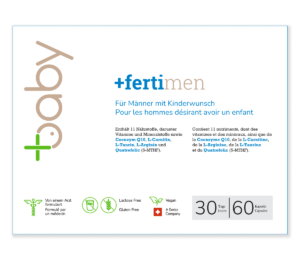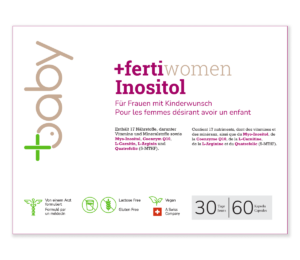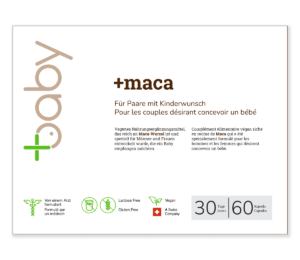Written by the Magali Russell

Table of Contents
ToggleFolic acid, also known as vitamin B9, is crucial during pregnancy. It helps protect the health of both mother and baby. Health experts widely recognise this form of vitamin B9 — sometimes referred to as acid folic in other languages — for its role in prenatal health. Taking folic acid for pregnancy supports early fetal development and prevents complications. It plays a fundamental role in cell growth and the development of the fetal nervous system. Adequate folic acid intake helps prevent pregnancy-related complications and supports healthy fetal growth.
Folic acid for pregnancy begins before conception — early intake is essential for ensuring a healthy pregnancy. Women of childbearing age should take 400 to 600 μg of folic acid daily, as this vitamin helps form new cells and prevents neural tube defects like spina bifida. In addition to folic acid, fertility food supplements can further support reproductive health and prepare the body for conception.
Spina bifida causes serious birth defects when the baby’s spinal cord does not develop properly. It often leads to neurological and physical issues. The body needs folic acid for pregnancy in the early weeks to help close the neural tube and prevent malformations by supporting healthy cell growth and division. Studies show that taking folic acid supplements before and during early pregnancy can lower the risk of such anomalies by 70%. Researchers have compared folic acid with its active form, 5-MTHF. Both forms support maternal and fetal health during pregnancy.
During pregnancy, the need for folic acid rises, as it helps with DNA production and red blood cell formation. But how much folic acid during pregnancy is enough? Experts recommend 600 μg daily during pregnancy, which may increase depending on individual needs and risk factors. A deficiency in vitamin B9 can lead to anemia in the mother, increasing the risk of preeclampsia, premature birth, and low birth weight.
Doctors consistently advise women to take folic acid supplements throughout all three trimesters. It’s especially important during rapid nervous system development. Many doctors strongly recommend continuing supplementation to support healthy fetal growth. Products like PlusMum are formulated to meet these increased nutritional needs during pregnancy, providing folic acid along with other essential vitamins and minerals.
Beyond neural tube defects, folic acid deficiency can also lead to congenital heart defects, facial anomalies such as cleft lip, and intrauterine growth delays.
In addition to supplements, folic acid foods such as leafy greens, beans, oranges, and fortified cereals help support daily vitamin B9 intake during pregnancy. Including these in your regular diet can boost natural folate levels and contribute to a healthier pregnancy.
To ensure you get all the vital nutrients, including folic acid, consider taking prenatal vitamins. Discover why prenatal vitamins are important in our detailed guide.
After childbirth, folic acid remains essential, particularly during breastfeeding. Breast milk is the primary source of nutrients for the infant, and an adequate intake of vitamin B9 supports brain growth and cognitive development. While this phase comes after birth, folic acid for pregnancy still plays a supportive role in postnatal care and maternal health.
The recommended folic acid intake remains high during this period, with 500 μg per day recommended for breastfeeding women. Maintaining a diet rich in vitamin B9 or continuing supplementation ensures high-quality breastfeeding.
Folic acid doesn’t just benefit pregnant women; it also plays a crucial role in male fertility. The body uses vitamin B9 directly in spermatogenesis, the process of sperm production. Folic acid deficiency can lead to reduced sperm count, altered sperm morphology and increased sperm DNA damage, all of which can compromise fertility.
Studies have shown that men with insufficient folic acid intake have a higher rate of chromosomal abnormalities in their sperm. These abnormalities may be responsible for an increased risk of early miscarriage or embryonic development disorders. Adequate folic acid intake therefore helps to improve sperm quality and reduce these risks.
Studies show that taking folic acid with zinc can increase sperm concentration and improve motility. Experts generally recommend a daily intake of around 400 μg for men aiming to optimise their fertility. You can also consider male-focused supplements like PlusMaca, which support sperm quality and overall reproductive function.
Natural sources of folic acid for men include green vegetables, legumes, and fortified cereals. However, in some cases, supplementation may be considered to ensure optimal intake. Opting for active forms such as 5-MTHF ensures better assimilation and increased bioavailability.
Folic acid is essential for women well before conception, as it plays a key role in ovulation and egg maturation. An adequate level of vitamin B9 promotes a regular menstrual cycle and better egg quality, thus increasing the chances of conception.
Women of childbearing age should ensure an adequate intake of folic acid, as a deficiency can affect oocyte formation and embryo viability after fertilization. This vitamin also supports cell division and DNA production, crucial processes from the earliest days of embryonic development.
Folic acid supplementation, particularly in the form of 5-MTHF, is often recommended for women trying to conceive. Studies show that women taking a vitamin B9 supplement have higher pregnancy rates and a lower risk of fertility-related complications. Those planning a pregnancy may also benefit from using reliable pregnancy tests to track early signs.
Diet remains an essential source of vitamin B9, with foods such as spinach, citrus fruits, and legumes providing valuable nutrients. However, because the body needs more B9 during the preconception period, health professionals often recommend supplements to ensure optimal intake and maximise the chances of conception.



Not all forms of folic acid are absorbed the same way by the body. About 40% of the population has a mutation in the MTHFR gene, which limits their ability to convert standard folic acid into its active form, reducing its effectiveness.
Quatrefolic and 5-MTHF (5-methyltetrahydrofolate) are biologically active forms of folic acid, directly usable by the body without conversion. These alternatives offer better bioavailability and are particularly recommended for women who have difficulty metabolizing conventional folic acid.
Although supplements are recommended, a balanced diet can also provide a portion of the necessary folic acid. Here are some foods rich in vitamin B9:
A varied and balanced diet, combined with appropriate supplements, ensures optimal folic acid intake. For example, a daily menu rich in vitamin B9 could start with a breakfast smoothie made with spinach and orange. Lunch might include a lentil salad with kale and lemon dressing. For dinner, you could enjoy a serving of salmon.
The link between folic acid and pregnancy health is well-documented, making it one of the most recommended supplements for expecting mothers. Folic acid is essential at every stage of motherhood, from conception to breast-feeding. It prevents birth defects, promotes a healthy pregnancy, and supports infant development. The use of active forms such as Quatrefolic or 5-MTHF ensures optimal assimilation and maximises the benefits of this essential vitamin. Adopting a diet rich in folic acid and following medical recommendations is the best strategy for ensuring the well-being of both mother and baby.
In conclusion, the role of folic acid for pregnancy is vital at every stage — from pre-conception through breastfeeding. Ensuring proper intake not only benefits the baby’s development but also safeguards the mother’s health.
Explore more pregnancy and fertility support at PlusBaby — your trusted partner in every stage of your parenting journey.


Table of Contents
ToggleAcheter les produits de cet article

I am Magali Russell, the founder of Plusbaby. With over 15 years of experience in research and development, I created and led a preclinical research organisation that conducted rigorous scientific studies on numerous products.The moving stories of women and couples struggling with infertility left a lasting impression on me. This is how I found my calling in life: helping others become parents by offering them genuine support.
Convinced of the benefits of natural products, I created Plusbaby: vegan dietary supplements, developed in Switzerland, combining proven science and pure, premium, additive-free ingredients to boost fertility naturally.
Continue reading
